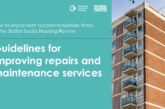Former service personnel suffering from PTSD or other mental illnesses will be prioritised for social housing under proposals published for consultation by Communities Secretary Rt Hon James Brokenshire MP.
The new measures could help councils ensure that members of the Armed Forces and veterans suffering from mental ill health are offered the right priority for social housing. The proposals include extra training for council staff so they are better equipped to give serving Armed Forces personnel and veterans the housing support they need.
The measures will also help people who divorce or separate from their partners in the Armed Forces by exempting them from rules requiring them to be a local resident before being given a property.
While the majority of military personnel transition successfully into civilian life, an overhaul of the system will also mean all applicants for social housing will be asked if they have served in the Forces at the outset of the process to ensure veterans get the help they are entitled to.
Communities Secretary Rt Hon James Brokenshire MP said: “We have a duty to ensure our heroic military personnel get the support they need when applying for a social home. We want to see that applying for social property should not be a challenge in the transition from military service to civilian life. These new measures are part of our continuing commitment to the Armed Forces Covenant.”
Housing support
Ed Tytherleigh, Chief Executive of Stoll, an Executive Board Member of Cobseo, Co-chair of the Cobseo housing group and a member of the National Housing Federation taskforce on homelessness comments: “Too many vulnerable people who have served in the Armed Forces do not get appropriate housing support from local authorities. That’s why we published a Call to Action last year urging the Government to ensure that vulnerable veterans who approach local authorities for social housing get the support they need.
“Local authorities have an instrumental role to ensure that veterans do not slip through the net and end up homeless. The experience of the veterans we work with is that the response from LAs is patchy and inconsistent. Some local authorities are playing their part — but we need every LA to ask someone applying for social housing if they have served in the Armed Forces. If the answer is yes, that information must be recorded and acted upon so that the Veteran can then access appropriate housing.
“Having served in the Armed Forces and, despite the commitments given in the Armed Forces Covenant, too many veterans live in inappropriate accommodation, sofa surf, reside in hostels or end up homeless on the streets. We welcome the Government’s consultation. Simple practical measures will help us avoid Veterans becoming homeless.”
Tina Fairbrass, a Stoll resident who served in the Navy for seven years, including working for NATO and being posted to the Falklands says: “After I left the Navy I found myself in an abusive relationship and had to leave my partner before things got even worse. I was living on £20 a week, had a three-year old daughter and was diagnosed with severe depression and anxiety.
“I contacted my local authority to ask for help and was simply given a list of local landlords who would accept housing benefit. Unfortunately none of these landlords were prepared to help and when I told the local authority this, I was told they couldn’t help me further. I had nothing as my partner had spent my life savings and I had subsequently lost my home. The local authority did not view my case as a priority even though I was homeless with no family to rely on.
“It was only when an ex-Navy colleague referred me to Stoll that my situation changed. I was offered a two-bedroom flat that very day and have been there ever since. A secure home is absolutely crucial to rebuilding your life and I don’t know where I would be without Stoll. I welcome the Government’s announcement, hopefully it will prevent other vulnerable, veterans finding themselves homeless with nowhere to go.”









